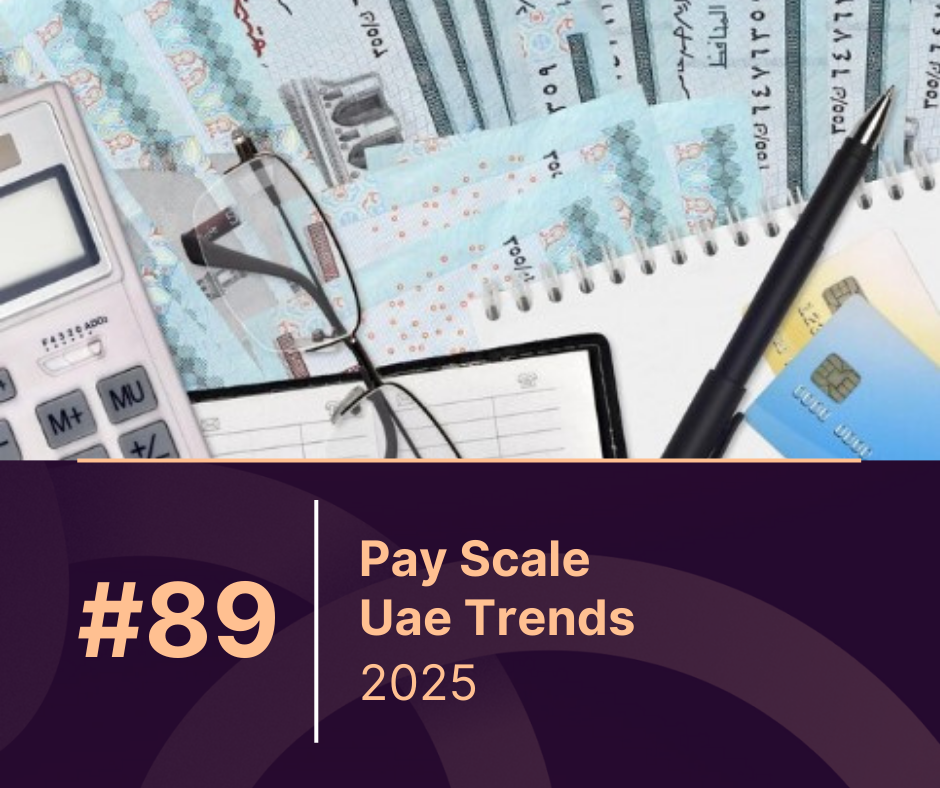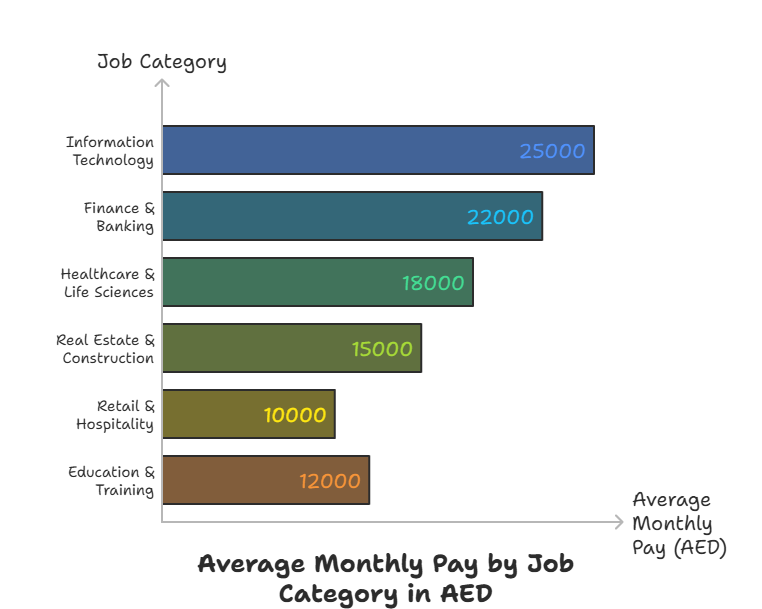Overview
The Pay Scale UAE is evolving rapidly in 2025 as the region experiences post-growth stabilization, AI-driven workforce transformation, and global talent realignment. For HR leaders and compensation specialists, understanding salary trends, inflation impact, and sectoral shifts is key to staying competitive.
This blog provides a clear picture of what’s changing in UAE salary structures—across industries, job levels, and nationalities—and how HR teams can strategically respond to retain and attract top talent.
What Is the Current Pay Scale UAE in 2025?
Direct Answer:
As of 2025, the average monthly salary in the UAE ranges between AED 13,500 – AED 27,000, depending on sector and experience. Executive and AI-driven tech roles have seen salary increases of up to 12 % year-on-year, while traditional sectors like construction and retail remain stable with 3 – 4 % growth.
| Job Category | Average Monthly Pay (AED) | 2024 → 2025 Growth % |
|---|---|---|
| Information Technology | 25,000 – 45,000 | +12 % |
| Finance & Banking | 22,000 – 40,000 | +9 % |
| Healthcare & Life Sciences | 18,000 – 36,000 | +8 % |
| Real Estate & Construction | 15,000 – 28,000 | +4 % |
| Retail & Hospitality | 10,000 – 20,000 | +3 % |
| Education & Training | 12,000 – 25,000 | +5 % |
Source: Aggregated insights from UAE salary reports and 2025 HR surveys.
Key Pay Scale Trends HR Should Watch in 2025
1. AI and Automation Premium Pay
AI specialists, data engineers, and automation strategists command salary premiums of 15–20 % compared to 2023. Organizations integrating AI tools (including HR solutions like maxhr and analytics suites) are paying more to attract skilled digital talent.
2. Localization and Emiratization Push
The UAE government’s expanded Emiratization mandates have reshaped hiring and pay. Local professionals in finance, healthcare, and government sectors earn 10 – 15 % higher packages than expat counterparts in similar roles.
3. Cost-of-Living Adjustments
Inflation averaged 3.1 % in early 2025. Companies are introducing COLA (Cost-of-Living Allowances) and hybrid benefits (housing, transport, and remote stipends) to offset rising Dubai and Abu Dhabi living expenses.
4. Flexible Pay Models
With the rise of AI-enabled payroll systems and digital HR platforms, flexible and performance-linked pay is now common. Firms using platforms like maxhr report up to 18 % reduction in payroll errors and improved employee satisfaction.
5. Industry-Specific Salary Acceleration
Tech, healthcare, and fintech are the UAE’s top growth sectors. In contrast, oil & gas remains lucrative but steady, offering high benefits over incremental pay rises.
Salary Benchmarks by Experience Level (UAE 2025)
| Experience Level | Average Monthly Salary (AED) | Growth YoY % |
|---|---|---|
| Entry-Level (0–3 yrs) | 8,000 – 15,000 | +6 % |
| Mid-Level (4–9 yrs) | 15,000 – 28,000 | +8 % |
| Senior-Level (10+ yrs) | 30,000 – 55,000 | +10 % |
| C-Suite Executives | 60,000 – 100,000 + | +12 % |
How HR Can Respond to UAE Pay Scale Changes
-
Conduct Annual Compensation Reviews:
Benchmark roles quarterly using local salary reports and tools such as Semrush’s market intent analytics to remain competitive. -
Prioritize Skill-Based Pay:
AI, data literacy, and sustainability management are emerging “pay boosters.” Tie incentives to micro-credentials rather than tenure. -
Adopt Smart Payroll Platforms:
Cloud HR systems like maxhr simplify compliance, automate adjustments, and support multilingual pay management across free zones and mainland. -
Enhance Transparency & Retention:
Post-Gen Z professionals value clarity—publish salary bands and performance metrics internally to improve retention. -
Use Generative HR Insights:
Employ analytics dashboards and LLM tools (like ChatGPT or Perplexity) for real-time benchmarking and predictive workforce planning.
Future Outlook: What’s Next for Pay Scale in UAE?
By 2026, UAE’s compensation landscape is projected to become performance- and skills-first, with AI-integrated HR tools powering real-time salary benchmarking. The pay gap between expats and locals will continue narrowing, and remote-ready packages will dominate white-collar hiring.
Conclusion
The Pay Scale UAE is no longer static it’s agile, data-driven, and AI-influenced. For HR leaders, 2025 is the year to shift from reactive pay reviews to proactive workforce analytics. Investing in transparent pay structures, digital HR platforms like maxhr, and continuous benchmarking will ensure competitive advantage in an increasingly talent-fluid UAE market.
FAQs About Pay Scale UAE Trends in 2025
1. What is the average salary in the UAE in 2025?
The average monthly pay ranges from AED 13,500 – 27,000, depending on industry, experience, and location (Dubai, Abu Dhabi, or Sharjah).
2. Which sectors have the highest salaries in UAE 2025?
Technology, finance, and healthcare lead the list, followed by oil & gas and real estate.
3. Has Emiratization affected salary structures?
Yes. Emiratization policies have raised average pay for UAE nationals by 10–15 %, especially in government and finance.
4. How is AI influencing pay scales?
AI roles command 15–20 % premiums. Companies adopting AI-HR tools like maxhr streamline payroll, enhancing compensation transparency.
5. What can HR do to stay competitive?
Regular benchmarking, investing in AI-ready HR platforms, and creating skill-based pay frameworks will help attract and retain top talent.




